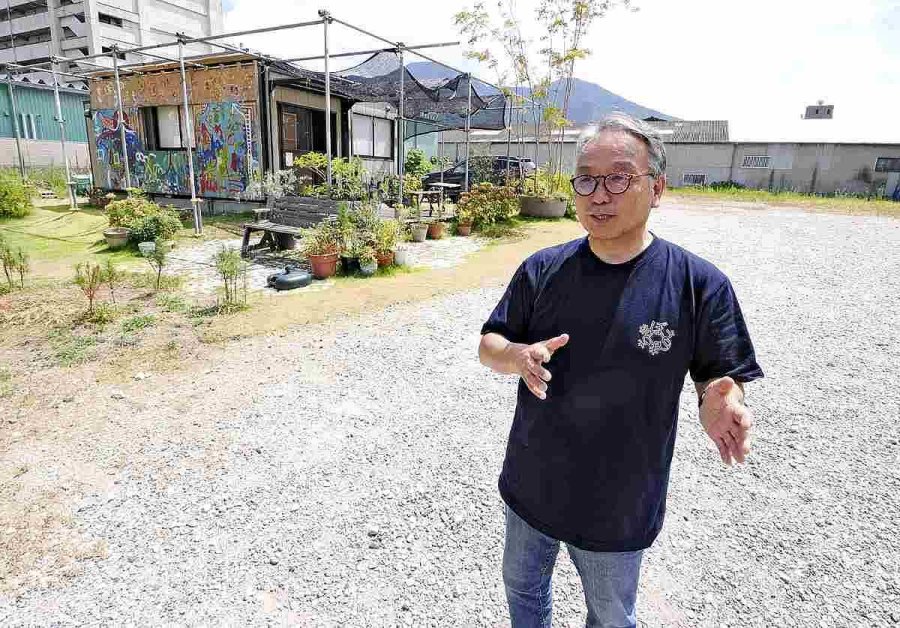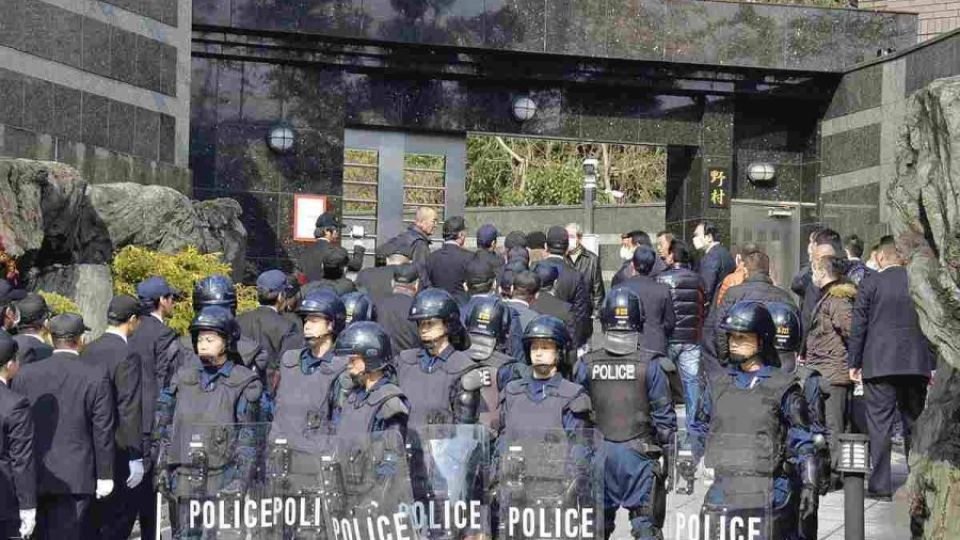September 26, 2024
TOKYO – About 400 yakuza crime syndicate offices were closed around the nation between 2014 and 2023, according to the National Police Agency.
Sept. 11 marked 10 years since the Fukuoka prefectural police arrested Kudo-kai chief Satoru Nomura on suspicion of homicide, with an eye on wiping out the only crime syndicate designated as especially dangerous by the national government. As part of what they called “the summit operation,” targeting yakuza’s leadership, the police also arrested the group’s second-in-command, Fumio Tanoue. Kudo-kai is based in Kitakyushu, Fukuoka Prefecture.
Momentum for the elimination of yakuza criminal organizations has been growing since the launch of the operation, and more syndicate offices have been closed thanks to the active involvement of public organizations in the efforts.

Tomoshi Okuda talks about the construction planned for the site of the Kudo-kai headquarters office in Kokurakita Ward, Kitakyushu, on Aug. 1. PHOTO: THE YOMIURI SHIMBUN
“The neighborhood has become a safe place where children can go around without worry. A national restaurant chain has also opened a location here,” said Tomoshi Okuda, 61, late last month. Okuda chairs Hoboku, a nonprofit organization that plans to construct a welfare facility complex on the site of Kudo Kaikan, the former headquarters of the Kudo-kai.
Kudo Kaikan, located in a residential area about 2 kilometers southeast of JR Kokura Station, was long feared as a symbol of the crime syndicate, as it was frequented by Kudo-kai members and their black cars.
However, their use of the office was restricted after the launch of the summit operation, and it was sold to a private company in the prefecture in 2019. All of the profits from the sale of the office were paid to civilian victims of attacks in which the Kudo-kai was involved.
In April 2020, Hoboku purchased the site from the company.
The Kitakyushu city government served as the contact point for negotiations with the Kudo-kai over the sale of the lot. The city also took the lead in finding a buyer for the property.
Kazuhide Umemoto, 69, who led the negotiations for about nine months as then deputy mayor of Kitakyushu, said, “Thanks to our involvement in the case as a government body, we created public trust and managed to find a buyer.”
Hoboku plans to build a three-story facility housing a relief center for welfare recipients and a community hall. “I want to change Kitakyushu, which has long been seen as a ‘dangerous city,’ into a place where people want to live,” Okuda said.
Sharing know-how
Although the NPA has not disclosed the total number of crime syndicate offices, requests by residents and other factors led to the closure of 407 such offices nationwide between 2014, when the summit operation was launched, and 2023.
In 2014, 41 crime syndicate offices were closed, followed by 62 in 2016. Fifty-six offices were shut down in 2017 and 52 in 2018, respectively. The crime syndicate office closures gradually decreased after 2020.
By prefecture, 68 syndicate offices were closed in Tokyo, followed by 63 in Fukuoka, home to five designated crime syndicates — the largest number of such organizations in the country — including the Kudo-kai.
In Hyogo Prefecture, 35 were closed and 29 in Osaka Prefecture. Twenty-three offices each were closed in Aichi and Hokkaido prefectures.
A senior police official said the summit operation led to increased momentum for the elimination of organized crime syndicates nationwide, giving a major boost to efforts to remove their offices.
According to the Fukuoka prefectural police, 49 offices belonging to five designated syndicates were also demolished in the prefecture during the 10-year period, including 28 of the Kudo-kai, six of the Dojin-kai, based in Kurume, Fukuoka Prefecture, and five of the Namikawa-kai, based in Omuta in the same prefecture.
The Fukuoka prefectural police receives inquiries from other prefectural police offices and others regarding their methods of removing syndicate offices. They also share their experience at national conferences.
“Know-how on the elimination of the offices is being shared and accumulated throughout the country,” a senior prefectural police official said.
Acting on behalf of residents
In some cases, public organizations have filed lawsuits on behalf of local residents, demanding criminal organizations stop using their offices, in order to protect the residents from retaliation.
In October 2020, the Fukuoka prefectural center for removal of criminal organizations filed a provisional injunction seeking a ban on the use of Namikawa-kai’s headquarters office under the proxy lawsuit system. The move led to the demolition of the office in July 2021.
An office of a Higashiosaka, Osaka Prefecture-based affiliate of the Yamaguchi-gumi, a designated organized crime group that is engaged in conflicts, was also closed after a proxy lawsuit, and the city purchased the site of the office in December 2022 after the demolition was completed.
There also was a case in which a local government itself filed for a provisional injunction.
In December 2022, an office of the Kobe Yamaguchi-gumi, another organized crime group was removed in Fukutsu, Fukuoka Prefecture, after the city filed for an injunction seeking a ban on the use of the office.
The Kobe Yamaguchi-gumi was formed by a splinter group from the main body of the Yamaguchi-gumi.
In the city of Yoshida, Shizuoka Prefecture, an office of an affiliate of the Yamaguchi-gumi was closed in December 2019 thanks to joint efforts of the Shizuoka prefectural police, the prefectural bar association and the center for removal of criminal organizations.
Eiichiro Mizuno, 82, of Hamamatsu, Shizuoka Prefecture, who led local residents’ efforts to get rid of a crime syndicate office in the city, said, “I think locals find it easier to speak up when public bodies take a big part in the issues.”
“The fact that the efforts by the police and others were able to weaken Kudo-kai, known as a dangerous crime syndicate, gave residents the courage to take action to eliminate gangs,” said Osaka Bar Association member Kiyoshi Hikita. Hikita is an executive of the Japan Federation of Bar Associations’ committee on measures against gangsters’ intervention in business transactions and civil affairs.
“We should continue pursuing the elimination of crime syndicates, including the removal of their offices, using methods appropriate to each situation,” Hikita said.

